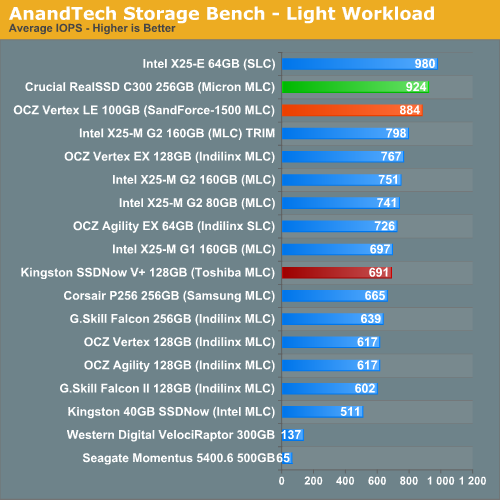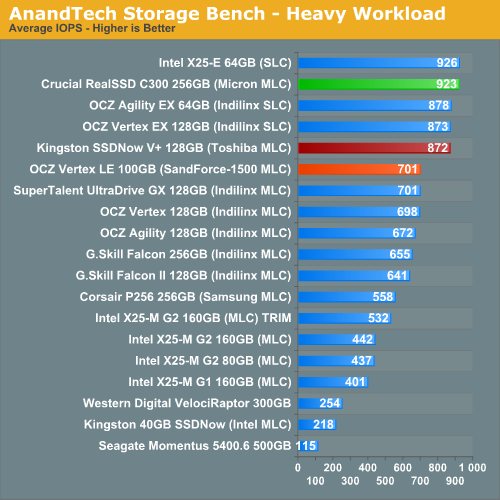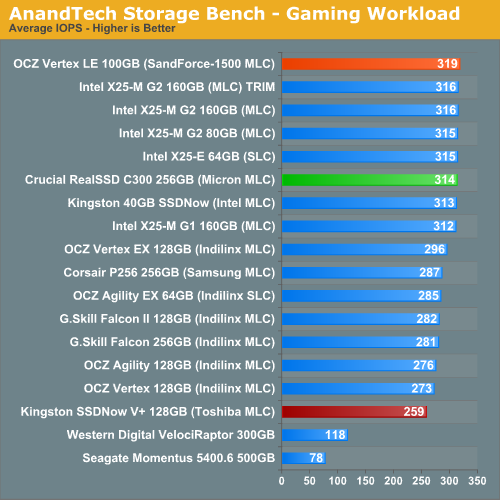OCZ’s Vertex Limited Edition Review & SSD State of the Union
by Anand Lal Shimpi on February 19, 2010 12:00 AM EST- Posted in
- Storage
AnandTech Storage Bench
Note that our 6Gbps controller driver isn't supported by our custom storage bench here, so the C300 results are only offered in 3Gbps mode.
The first in our benchmark suite is a light usage case. The Windows 7 system is loaded with Firefox, Office 2007 and Adobe Reader among other applications. With Firefox we browse web pages like Facebook, AnandTech, Digg and other sites. Outlook is also running and we use it to check emails, create and send a message with a PDF attachment. Adobe Reader is used to view some PDFs. Excel 2007 is used to create a spreadsheet, graphs and save the document. The same goes for Word 2007. We open and step through a presentation in PowerPoint 2007 received as an email attachment before saving it to the desktop. Finally we watch a bit of a Firefly episode in Windows Media Player 11.
There’s some level of multitasking going on here but it’s not unreasonable by any means. Generally the application tasks proceed linearly, with the exception of things like web browsing which may happen in between one of the other tasks.
The recording is played back on all of our drives here today. Remember that we’re isolating disk performance, all we’re doing is playing back every single disk access that happened in that ~5 minute period of usage. The light workload is composed of 37,501 reads and 20,268 writes. Over 30% of the IOs are 4KB, 11% are 16KB, 22% are 32KB and approximately 13% are 64KB in size. Less than 30% of the operations are absolutely sequential in nature. Average queue depth is 6.09 IOs.
The performance results are reported in average I/O Operations per Second (IOPS):

Under a typical, light poweruser workload, the Crucial RealSSD C300 bests OCZ's Vertex LE by 4.5% - not a tangible difference, just a (barely) measurable one. Intel's SLC X25-E is actually still the fastest thing here, which must be frustrating for Intel since the only thing separating the G2s from topping the charts is sequential write speed.
The Toshiba based Kingston drive performs similarly to the MLC based Indilinx drives, which is good since that's exactly where it's supposed to perform.
If there’s a light usage case there’s bound to be a heavy one. In this test we have Microsoft Security Essentials running in the background with real time virus scanning enabled. We also perform a quick scan in the middle of the test. Firefox, Outlook, Excel, Word and Powerpoint are all used the same as they were in the light test. We add Photoshop CS4 to the mix, opening a bunch of 12MP images, editing them, then saving them as highly compressed JPGs for web publishing. Windows 7’s picture viewer is used to view a bunch of pictures on the hard drive. We use 7-zip to create and extract .7z archives. Downloading is also prominently featured in our heavy test; we download large files from the Internet during portions of the benchmark, as well as use uTorrent to grab a couple of torrents. Some of the applications in use are installed during the benchmark, Windows updates are also installed. Towards the end of the test we launch World of Warcraft, play for a few minutes, then delete the folder. This test also takes into account all of the disk accesses that happen while the OS is booting.
The benchmark is 22 minutes long and it consists of 128,895 read operations and 72,411 write operations. Roughly 44% of all IOs were sequential. Approximately 30% of all accesses were 4KB in size, 12% were 16KB in size, 14% were 32KB and 20% were 64KB. Average queue depth was 3.59.

I ran and re-ran the tests - they're accurate. The Vertex LE does well, just not as good as the Kingston or Crucial drives here. The Crucial RealSSD C300 is simply a beast in our write-heavy test. I suspect that the fact that many of our writes here are compressed is to blame for the Vertex LE not being as fast as usual here. Remember that SandForce's architecture works by data reduction, whether through compression, deduplication or other similar natured algorithm. By definition those algorithms don't work well on data that is already being written in reduced form. If you're dealing with a lot of compressed archives, the Vertex LE will perform well, but not as well as the RealSSD C300.
Our final test focuses on actual gameplay in four 3D games: World of Warcraft, Batman: Arkham Asylum, FarCry 2 and Risen, in that order. The games are launched and played, altogether for a total of just under 30 minutes. The benchmark measures game load time, level load time, disk accesses from save games and normal data streaming during gameplay.
The gaming workload is made up of 75,206 read operations and only 4,592 write operations. Only 20% of the accesses are 4KB in size, nearly 40% are 64KB and 20% are 32KB. A whopping 69% of the IOs are sequential, meaning this is predominantly a sequential read benchmark. The average queue depth is 7.76 IOs.

Just as we saw with our PCMark tests, all of the drives perform about the same here. If you're just going to be tossing games on your SSD, you can't really go wrong with any of these drives. It's possible that if we were able to use our 6Gbps controller here that Crucial would break the mold as the drives here appear to be limited by sequential read speed.










83 Comments
View All Comments
v12v12 - Tuesday, February 23, 2010 - link
YES! You tell these idiot RAID-0 fanboys that it's USELESS and doesn't offer any real world benefit for all the potential catastrophic FAILURE it can cause, and the fact that it's DOUBLE: the drive price, double the heat, double the noise, double the space required, double capacity loss... the list of negatives about RAID-0 go on and on.__ WHile nobody talks about RAID-1, like it's some redheaded-step-child. RAID-1 is the BEST thing anyone can do if they value their data. Screw a meager speed increase (very subjective/specific to the intended usage) when you risk losing it all and THEN you'll spend how many HOURS of DOWN TIME cursing your HDs to hell? Logic right out the window folks...
RAID-O has long been proven to be a complete WASTE OF TIME! Go search Xbit-labs, Storage review and the myriads of other comparisons that PROVE (again not my opinion) that it's a farce and doesn't belong on "desktop" systems at all: stupid gamers/fanboys never learn.
funkyd99 - Tuesday, February 23, 2010 - link
I wouldn't call double the capacity useless. Before you generalize everyone who uses RAID-0 as an "idiot fanboy", realize that:1. Some people need more than 160GB of storage for their primary drive, and prefer a hardware solution vs. a software solution such as dynamic disks.
2. Some people have a solid bare-bones backup solution in place, and can recover from a catastrophic failure in less than an hour.
3. RAID-1 on a desktop is the waste of time and hardly the best thing someone can do if they value their data. Please tell me how RAID-1 will save your data if a faulty power supply fries everything in your computer, or a faulty controller writes a bunch of garbage to both disks, etc. etc. An external drive and a weekly backup is safer than relying on RAID-1 as a backup solution.
4. Some people can get a point across without resorting to name-calling and CAPS.
mlambert890 - Thursday, February 25, 2010 - link
This is so well said. Why are so many people so insanely emotionally involved with disk drives, video cards, etc?There is no "final answer" discussing RAID 0. Lots of people like to declare they have a "final answer" and call anyone who dissents an "idiot", but this is just noise.
As has always been the case with *any* RAID level, cost/benefit analysis really depends almost entirely on your use case and indvidiual situation. It is tempting to try to paint with a broad brush (especially on web forums), but reality just doesnt work that way
Anyone who understands RAID, storage, or really technology in general in any meaningful way, knows this.
A lot of technology passes through my hands as a result of my profession (and a lot has come and gone during the course of a 20 year career).
Annecdotally, I can tell you right now that I absolutely "feel" the difference between Intel SSD single drive and the sames drives in RAID 0. I have the two setups sitting right here for testing. Synethetics show a difference, and the difference is measurable and noticeable. Many people say they don't notice the difference between SSD and *HDD*. They arent wrong - perception is subjective.
Objectively, however, RAID-0 yields a performance increase. Whether or not one can perceive it or feels the tradeoff is worth it (as is ALWAYS the case with RAID-0), is a subjective and individual decision.
Some day a lot of these kids are going to look back on their post history (unique thing - your words last forever on the internet) and wonder what the heck they were thinking...
kmmatney - Friday, February 19, 2010 - link
I agree. NewEgg just had the Intel 80 GB SSD on sale for $219. They sold out pretty fast, though. I think at the end of the day, you can't go wrong with Intel for an SSD. Their toolbox can schedule a anutomatic TRIM operation once a week for Windows Xp systems as well, so lack of autoatic TRIM in Window XP is not an issue.leexgx - Saturday, February 20, 2010 - link
intel toolbox will only work in AHCI mode (Sata mode as well i think but you lose NCQ) and no updated chipset drivers or no intel matrix drivers installedmschira - Friday, February 19, 2010 - link
typo gallore...
But I am so excited...
M.
micksh - Friday, February 19, 2010 - link
Vertex LE 200GB is $920 at Amazon (preorder, no availability date)http://www.amazon.com/OCZ-Technology-Limited-2-5-I...">http://www.amazon.com/OCZ-Technology-Li...-Inch-OC...
Just one note. Numbers on charts are aligned to bars and text is aligned to the left edge of the chart. If the bar is too short the numbers overlap with text and it's hard to read the numbers.
Shining Arcanine - Friday, February 19, 2010 - link
I thought Linux's ext4 and btrfs filesystems supported TRIM too. Why do you say that only Windows 7 supports TRIM?Chlorus - Sunday, February 21, 2010 - link
Because BTRFS is still experimental and EXT4 is a piece of shit that randomly corrupts large files?gwolfman - Friday, February 19, 2010 - link
Anand,I'm jealous of your serial number: 1.
OCZ showing some special love to you. :)